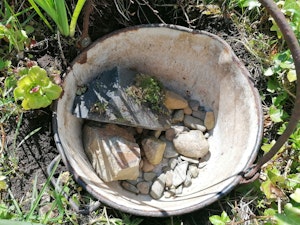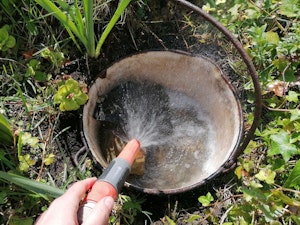Build a Tiny Pond
There are many ways you can attract wildlife into your garden or backyard but creating a healthy water source is probably one of the best things you can do. The good news is that you can do this as a family with very few materials, and spring is the perfect time of year to do it.
WHAT YOU MIGHT SEE
It’s exciting to watch pond skaters, water boatmen, snails, water beetles and, if you’re lucky, a few damselflies darting around the water. You might even see a bird having a bath.
WHAT YOU WILL NEED
- A large container that will hold water
- Some clean gravel and rocks
- Some small pond plants or plants in pots to surround your pond
STEP BY STEP
1. Find a large watertight container
It could be a large bucket, an old Belfast butler sink, or even a large washing-up bowl. It needs to be strong to withstand being outside, especially frosts.

2. Choose your spot before you add water
Once it’s full of water it will be difficult to move! Ideally put it somewhere that gets a good amount of light but isn’t in full sunlight all day. You can sink it into the ground or leave it standing on the surface, but if the edges are level with the ground more creatures can get in and out.

3. Make sure it’s safe for everyone
Even a tiny pond can be a hazard for small children, so position it where it will be safe and in full view of adults.
4. Get started
Put a layer of small stones in the bottom, this gives your pond an interesting texture and helps plants to root to the bottom. Don’t use soil – it is too full of nutrients and it will prompt blooms of algae to form.
5. Make sure your pond has a wildlife ladder
Use bricks, rocks or logs to create stepping stones in and out of the pond. It is vital that the pond is not a trap for creatures such as hedgehogs.

6. Hooray, now you can fill your pond
If you have a water butt use the rainwater from that. Tap water can contain many chemicals that do not allow a healthy new pond to grow.

7. Plant up your pond
This is the trickiest bit if you want to avoid buying things for your pond. Over time, aquatic plants may appear on their own and eventually you may be able to swap some healthy pond plants with a neighbour or a friend, but for now you can transform your pond into a safe haven for wildlife with marginal plants.
Have you got some plants in pots that you could move to sit around your pond? Marginal plants create shelter for visiting wildlife and some shade for your pond.

8. Share your pond with everyone
Take a picture of your fantastic new pond and let us know when you see wildlife using your new pond.
To share your pictures, post them on CAT’s facebook page or tag @centreforalternativetechnology on instagram. #CATatHome
Email sign up
Keep up to date with all the latest activities, events and online resources by signing up to our emails and following us on social media.
